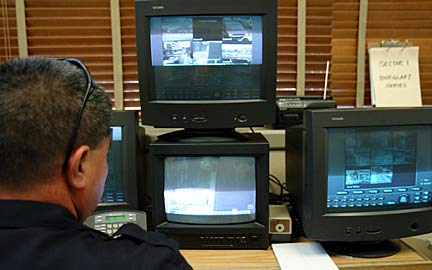
|
Police seek aid in
watching Chinatown
Above the streets of Chinatown, enclosed in tinted glass domes, street cameras appear to be monitoring the area to keep it crime-free.
Chinatown Camera Volunteers
Those interested in volunteering for five hours a week to monitor the Chinatown surveillance cameras must pass a criminal history check and a financial check and be U.S. citizens, nationals, or permanent resident aliens. Call the Honolulu Police Department Human Resources Division at 529-3336.
|
There are four monitors with access to all the cameras set up near the front desk at the Chinatown police substation, but the officer there can only cast an occasional glance while he works his shift.
"It's a little tough because people are walking in with cases, there's paperwork and answering phones," said Lt. Jerry Inouye. "It makes it fairly hard to put someone full time on the cameras."
Police are hoping that will change soon and are recruiting volunteers to monitor the cameras.
"We'd like a dozen, mostly for afternoons and evenings," said police Maj. Kevin Lima.
The city spent about $500,000 to install cameras in Chinatown and Waikiki back in 1998.
The cameras worked at first, catching criminals in the act. The evidence was upheld in court.
But in the last few years, inadequate maintenance put all but two of the cameras out of service.
Last year, the city budgeted about $50,000 to repair and maintain the video surveillance system, and all but four of the cameras are now back in operation.
The city began trying to fix the cameras in 2001 when they awarded a $254,000 contract to reconnect cameras that were disconnected when police moved the Chinatown substation from Nuuanu Avenue to its present location at Maunakea and Hotel streets.

There are four monitors with access to all the cameras set up near the front desk at the Chinatown police substation, but the officer there can only cast an occasional glance while he works his shift. The Honolulu Police Department hopes to recruit volunteers to monitor the cameras.
However, when the cameras stopped working, the volunteers stopped coming.
Lynne Matusow, chairwoman of the Downtown Neighborhood Board, said the problem kept the community from getting fully involved.
"It's been a disaster," Matusow said. "Every time we got volunteers, the cameras broke.
"We've been going through this nonsense for years ... what you don't want is to get volunteers and get them excited to do something, and then it doesn't pan out and you can't get them back again."
Volunteers must also go through sexual harassment training as well as training on the proper procedures to operate the cameras.
"We don't want people looking, zooming in on people on the street unless they see something suspicious," Inouye said. "Though it's a public street, there's some expectation of privacy, such as if you're driving in your car."
[News] [Business] [Features] [Sports] [Editorial] [Do It Electric!]
[Classified Ads] [Search] [Subscribe] [Info] [Letter to Editor]
[Feedback]
